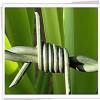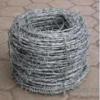Description:Barbed wire, also known as barb wire, is a type of fencing wire constructed with sharp edges or points arranged at intervals along the strands. It is used to construct inexpensive fences and is used atop walls surrounding secured property. It is also a major feature of the fortifications in trench warfare.
The most important and most time-consuming part of a barbed wire fence is constructing the corner post and the bracing assembly. A barbed wire fence is under tremendous tension, often up to half a ton and so the corner post's sole function is to resist the tension of the fence spans connected to it. The bracing keeps the corner post vertical and prevents slack from developing in the fence.
Brace posts are placed in-line about 8 feet (2.4 m) from the corner post. A horizontal compression brace connects the top of the two posts, and a diagonal wire connects the top of the brace post to the bottom of the corner post. This diagonal wire prevents the brace post from leaning, which in turn allows the horizontal brace to prevent the corner post from leaning into the brace post. A second set of brace posts (forming a double brace) is used whenever the barbed wire span exceeds 200 feet (61 m). If an 8" post is * feet in length is driven four feet into the ground the brace post assembly can be omitted.
When the barbed wire span exceeds 650 ft (200 m), a braced line assembly is added in-line. This has the function of a corner post and brace assembly but handles tension from opposite sides. It uses diagonal brace wire that connects the tops to the bottoms of all adjacent posts.
Line posts are installed along the span of the fence at intervals of 8 to 50 ft (2.4 to 15 m). An interval of 16 ft (4.9 m) is most common. Heavy livestock and crowded pasture demands the smaller spacing. The sole function of a line post is not to take up slack but to keep the barbed wire strands spaced equally and off the ground.
Once these posts and bracing have been erected, the wire is wrapped around one corner post, held with a hitch (a timber hitch works well for this) often using a staple to hold the height and then reeled out along the span of the fence replacing the role every 400 m. It is then wrapped around the opposite corner post, pulled tightly with wire stretchers, and sometimes nailed with more fence staples, although this may make readjustment of tension or replacement of the wire more difficult. Then it is attached to all of the line posts with fencing staples driven in partially to allow stretching of the wire.
It is installed from the top down!
There are several ways to anchor the wire to a corner post:
- Hand-knotting. The wire is wrapped around the corner post and knotted by hand. This is the most common method to attaching wire to a corner post. A timber hitch works well as it stays better with wire than with rope.
- Crimp sleeves. The wire is wrapped around the corner post and bound to the incoming wire using metal sleeves which are crimped using lock cutters. This method should be avoided because while sleeves can work well on repairs in the middle of the fence where there is not enough wire for hand knotting, they tend to slip when under tension.
- Wire vise. The wire is passed through a hole drilled into the corner post and is anchored on the far side.
- Wire wrap. The wire is wrapped around the corner post and wrapped onto a special, gritted helical wire which also wraps around the incoming wire, with friction holding it in place.
Barbed wire for agriculture use is typically double-strand 12½-gauge, zinc-coated (galvanized) steel and comes in rolls of 1,320 ft (400 m) length. Barbed wire is usually placed on the inner (pasture) side of the posts. Where a fence runs between two pastures livestock could be with the wire on the outside or on both sides of the fence.
Galvanized wire is classified into three categories; Classes I, II, and III. Class I has the thinnest coating and the shortest life expectancy. A wire with Class I coating will start showing general rusting in 8 to 10 years, while the same wire with Class III coating will show rust in 15 to 20 years. Aluminum-coated wire is occasionally used, and yields a longer life.
.jpg)


.jpg)


.jpg)
.jpg)







.jpg)




